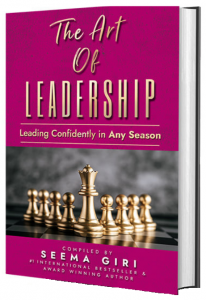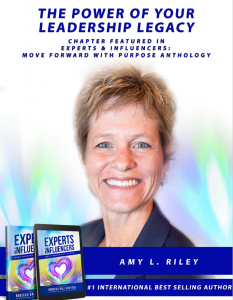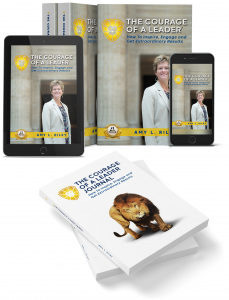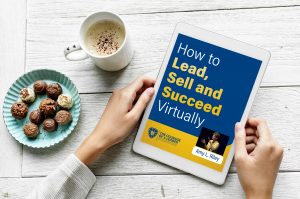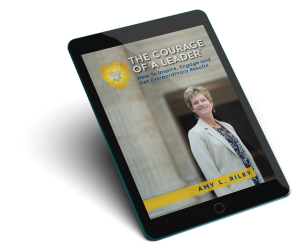Meet Daphna Horowitz, a CEO coach, leadership expert, and author known for her bold approach to leadership and personal growth. Daphna believes that courage is essential in navigating the complexities and uncertainties leaders face today. She introduces the idea that true leadership starts from within, requiring self-awareness and the willingness to make bold moves, even in the face of fear. Daphna explains that leaders must embrace discomfort and push beyond their comfort zones to achieve growth for themselves and their organizations.
In our conversation, we explore her “ABC” leadership model, which highlights three key areas: Awareness, Bold moves, and Communication, and explores each at two levels. Daphna emphasizes that understanding ourselves is the foundation of courageous leadership. Leaders must also make bold decisions, even in uncertain circumstances, and communicate effectively to create strong connections with their teams. Through practical advice and personal insights, Daphna encourages leaders to embrace vulnerability, build deeper relationships, and continually grow by staying curious and open to learning.
Key Takeaways:
1. Self-Awareness is Key: Leadership starts from within. Knowing your strengths, weaknesses, and motivations allows you to lead more effectively.
2. Courage in Uncertainty: Leaders face constant ambiguity. Bold decisions are essential, even when you don’t have all the answers.
3. Effective Communication: Clear, consistent communication builds trust and connection with your team, even in uncertain times.
4. Bold Moves Drive Growth: Taking risks, despite fear, is necessary for personal and organizational growth.
5. Continuous Learning: Great leaders stay curious, continually learning about themselves, their teams, and new ways to improve.
Resources Mentioned:
Courage to Lead: Leadership Lessons from Kilimanjaro by Daphna Horowitz: https://a.co/d/2sRMFYW
The Inspire Your Team to Greatness assessment (the Courage Assessment)
How can you inspire our team to be more proactive, take ownership and get more done?
You demonstrate and empower The Courage of a Leader. In my nearly 3 decades of work with leaders, I’ve discovered the 11 things that leaders do – even very well-intentioned leaders do – that kill productivity.
In less than 10 minutes, find out where you’re empowering and inadvertently kills productivity, and get a custom report that will tell you step by step what you need to have your team get more done.
https://courageofaleader.com/inspireyourteam/
About the Guest:
Daphna Horowitz is a CEO Coach , Leadership Expert, Author (and Actuary – its true!)
Daphna’s mission is to refine your leadership style – from top-performer to great leader – so that you create a workplace culture that inspires people and gets results.
She is always up for a challenge, has a A-type personality and always sets herself big goals and achieves them. That’s why when she became a director at the age of 23 in a large consulting company and one of only 5 women actuaries in South Africa, she began asking herself, what do I really want?
She fought for gender equality at work, took on volunteer leadership positions in various NPOs and then switched careers from exact sciences to humanities, because she has seen how a strong, supportive organisational culture makes a difference. In that process, she attained her MPhil cum laude and MCC (master certified coach) with the International Coach Federation.
And perhaps most significant to Daphna is to continue experiencing joy and life! She’s climbed Kilimanjaro, learned to play the saxophone, completed a pastry chef course, relocated to a new country and has written 2 books.
About the Host:
Amy L. Riley is an internationally renowned speaker, author and consultant. She has over 2 decades of experience developing leaders at all levels. Her clients include Cisco Systems, Deloitte and Barclays.
As a trusted leadership coach and consultant, Amy has worked with hundreds of leaders one-on-one, and thousands more as part of a group, to fully step into their leadership, create amazing teams and achieve extraordinary results.
Amy’s most popular keynote speeches are:
· The Courage of a Leader: The Power of a Leadership Legacy
· The Courage of a Leader: Create a Competitive Advantage with Sustainable, Results-Producing Cross-System Collaboration
· The Courage of a Leader: Accelerate Trust with Your Team, Customers and Community
· The Courage of a Leader: How to Build a Happy and Successful Hybrid Team
Her new book is a #1 international best-seller and is entitled, The Courage of a Leader: How to Inspire, Engage and Get Extraordinary Results.
http://www.courageofaleader.com
https://www.linkedin.com/in/amyshoopriley
Thanks for listening!
Thanks so much for listening to The Courage of a Leader podcast! If you got inspired and/or got valuable leadership techniques you can use from this episode and think that others could benefit from listening, please share using the social media buttons on this page.
Do you have questions or feedback about this episode? Leave a comment in the section below!
Subscribe to the podcast
If you would like to get automatic updates of new The Courage of a Leader podcast episodes, you can subscribe to the podcast on Apple Podcasts. You can also subscribe in your favorite podcast app.
Leave us an Apple Podcasts review
Ratings and reviews from our listeners are extremely valuable to us and greatly appreciated. They help our podcast rank higher on Apple Podcasts, which helps us ignite The Courage of a Leader in more leaders! Please take a minute and leave an honest review on Apple Podcasts.
Teaser for next episode
Join us in our next episode where Walt Hampton shares strategies for time mastery, teaching leaders how to say no, block time for deep work, align schedules with values, and minimize interruptions for better productivity and balance.
Transcript
How do you move forward confidently when faced with ambiguity and changing circumstances? My guest today, Daphna Horowitz is a CEO coach, an author and a leadership expert who talks about and writes about the importance of courage in leadership, a message that you know resonates with me. Daphna today shares with us her ABC Ladership Model - Awareness, Bold moves and Communication and more, showing how these elements help us as leaders, navigate uncertainty, make courageous decisions and foster continuous improvement. You'll love the way that Daphna thinks, and you'll love her practical advice. I'm glad you're here.
Amy Riley:Welcome to the Courage of a Leader podcast. This is where you hear real life stories of top leaders achieving extraordinary results, and you get practical advice and techniques you can immediately apply for your own success. This is where you will get inspired and take bold, courageous action. I'm so glad you can join us. I'm your host. Amy Riley, now are you ready to step into the full power of your leadership and achieve the results you care about most? Let's ignite the Courage of a Leader.
Amy Riley:Daphna, thanks for being here on the courage of a leader podcast today, I
Daphna Horowitz:am so excited to be here. Thank you, Amy for hosting me. Yeah,
Amy Riley:absolutely. You and I have been working on parallel paths for quite some time and focused on courage and leadership. So I'm so excited to dive into this conversation, we're going to talk about the courage to lead, what that is, why it's important, how it's an inside out job. Let me start first with the question, Daphna, why? Why do we need or want courage as leaders, there's so many mentorship behaviors and competencies and focus out there, I sometimes feel like you don't hear courage as much as we should. Why is it important?
Daphna Horowitz:Well, I think that is a huge question, but if we had to distill it into something that's very clear, I would say that leaders are faced with uncertainty, ambiguity, volatility, all the time. I often say that a leader's job is mainly about decisions. There are decisions that have to be made all the time with very often with very little information, and most of the time definitely not with enough information. And things have to be kept moving in a world that is constantly changing and uncertain, and in order to really be able to navigate your way through this world and achieve the success and the results that you want. As a leader, you need to have courage, because you're going to be, you know, taking risks, making mistakes, not always getting it right, and having all the information that you need, and that means that you're constantly walking on the edge of, I'm not always sure of what I'm doing, and for me, that requires courage. It's the courage to know and to own that and to understand that that's just part of the landscape, and the courage to then take a step even when you're not sure, even when you're afraid, even when you don't exactly know what to do, even to the courage to trust the people around you, and you're not always sure that you can. So there's always that measure of uncertainty. And I think uncertainty and courage go together. Yes,
Amy Riley:every cell of my body is nodding along with everything. You just had to say, Daphna, and when you started talking about the uncertainty that comes up for leaders in their day to day. I just really thinking about the layers of that right uncertainty in our marketplace. All of a sudden, there's a supply chain issue that we didn't have a week ago. Team dynamics that can come up. What can come up? The individuals, they're having a bad day, they got bad news, they're all of a sudden, reacting and responding in a way that you didn't expect or is unusual, and all those decisions about how to respond to what's going on in the moment, even the decision of, am I going to stop and handle this right now, or is this not the priority or the other thing, let alone, yeah. When to handle things, let alone what you're going to do about them. And really agree, in today's uncertain world, there's so much ambiguity, we have to be taking risks. We have to be trusting those around us, and they might be new team members, right? And you said, even when, right, even when there's that uncertainty, we still gotta be moving forward and making those choices.
Daphna Horowitz:And I love what you're saying. You're talking about the layers. There are three main layers over here. The one is the kind of business layer in the business context and working with external circumstances that come in, as you said, the markets change, suppliers let us down our client, cancel the big contract. All of those things are business related uncertainties, or where you need courage to understand the next step. Then the next layer is the layer of the people, the people that you're working with, and the relationships and the communication that you need to have that's so clear. And again, it's all the different stakeholders. It could be your team, it could be your clients, it could be your board members, investors, wherever you're at but it's really, how do you have courage in the face of those relationships? And really, you know, being able to connect with people and get them working with you or aligned with you to create what you want to create. And then I would say the deepest layer is the courage within yourself, yes, which is when you're feeling the fear, when you're feeling that uncertainty and what's going to happen, or what if it fails, you have the courage to take the step and go for it, and go for the big things, and find that within yourself, in the face of of fear, uncertainty and everything that we've spoken about. So it kind of felt very natural to go into those three layers as you were talking,
Amy Riley:yeah, yeah. I like how you've defined that. And I want to ask you some about what does courage look like, engaging at those different levels. But first, Daphna, let me tell listeners a little bit more about you. Daphna Horowitz is a CEO coach, leadership expert and author and actuary. Daphna's mission is to refine your leadership style from top performer to great leader, so that you create a workplace culture that inspires people and gets results. She's always up for a challenge and sets herself big goals and achieves them. When she became a director at the age of 23 in a large consulting company and one of only five female actuaries in South Africa, she began asking herself, what do I really want? She's fought for gender equality at work, has taken on volunteer leadership positions in various NPOs, and then switched careers from exact sciences to humanities, because she sees how a strong, supportive organizational culture makes all the difference. She attained her M Phil cum laude and MCC, which is a master certified coach certification with the International Coach Federation. And perhaps most significant to Daphna is to continue experiencing joy and life. She's climbed Kilimanjaro, learned to play the saxophone, completed a pastry chef course, relocated to a new country. Daphna has written two books, one of which is entitled, Courage to Lead: Leadership Lessons from Kilimanjaro. Thank you for being here. Daphna,
Daphna Horowitz:thank you for that beautiful introduction.
Amy Riley:Yeah, you and I have so many things in common, including playing the saxophone. Really,
Daphna Horowitz:I shouldn't even know that.
Amy Riley:But let's get let's get back to what does this look like? What does it take from all of us as a leaders to demonstrate courage when we're dealing with uncertainty at those three levels you describe? Yeah.
Daphna Horowitz:So I actually have this model of leadership. I call it the ABC model of leadership. I know it's just very simple, but I think it really brings to play that whole concept of what does it mean to have courage in leadership? And I think that there's always the practical layer and the deeper layer in each of those ABCs. So the A stands for awareness, and that's about self awareness, because, as we said, it's an inside, inside out job, and in order to be leading well, we need to be understanding ourselves. We need to know ourselves, our strengths, our blind spots. What are our motivations? Who are we? What do? What do we want in our life? And that's the awareness piece. Self awareness piece, know yourself better, and I say on a practical level, because I know when people hear self awareness, they think it's, oh, you know, all this work. You know, whether it's coaching or therapy or something that. Going to deep dive into yourself. And maybe not everybody has really the desire inclination to do that, or maybe sometimes even energy. But the truth is, on a practical level, if you know your strengths and weaknesses, if you know who you are, you are going to first of all understand your people better, and you're even going to make better hiring decisions, because you want your team to fill in the gaps of where you're not strong at in this world that we're living in, we understand that if you hire people, which is our tendency is to hire people who are more like us, because that's who we connect to better, and that's where we know have this wonderful energy going, but we actually need to move aside that tendency and say, Where are my gaps? Where do I need help and input? Where are the things that I don't know? And those are the people that you need to hire so you are just on a practical level. Level. Having that level of self awareness, knowing yourself means that you're going to build a better business for yourself as well. Yeah, definitely.
Amy Riley:I know you've got more to say about awareness on a deeper level. I so love that, and this is why I always love chatting with you. There's a chapter in the Courage of a Leader book called Embrace Your Weaknesses like Yes. So practically, we want to know how to lean into our strengths and really leverage that and show up as powerfully as we can. And if we embrace those weaknesses, all the things that you just said, Right, we're aware of them, and then we can lean on others. We can get others on the team that are going to round out that skill set exactly, exactly
Daphna Horowitz:if we take it that level deeper, it means that when we are able to own our weaknesses, and we are able to own our mistakes and be real and vulnerable with our people, we can really create even deeper connections and an even more impactful and Powerful team and in more impactful presence as leaders. So that's the self awareness piece, which I think is just absolutely critical. And I love that it's the A because that's where we need to start. We often don't start with that, you know. We start with the results, the performance, the external measures that are important as well. But if you really want to be a courageous, extraordinary leader, start with yourself, which I know is a message I'd be both, you know, without me.
Amy Riley:Yes, care about wholeheartedly. Yeah, agreed more. If we want to connect on a real human level, our level of self awareness allows for that opens that door right when we're able to say, Okay, here's how I'm feeling right now, I'm aware, I'm tuned into that right, that I'm able to make a conscious choice of what do I want to share with others in this moment, right, about what I'm thinking and feeling and going through that could be of use or a way to Connect, yeah, the human across from me. Thanks. Okay. B,
Daphna Horowitz:Okay, on to the B, so being here ties beautifully with our courage concept and courage theme for today, and that is about bold moves, which is where we started our conversation, right? Leaders need to make bold moves when we don't have all the information, when there's all the uncertainty, we still need. Need to take a step, and that's where we need to actually step up and be bold with our moves, as we can't always play it safe. We can't always just, you know, work in the space of what we know, because then we're not going to grow. So, yeah, on a practical level, it's that, what step am I? Am I going to take? What decision am I going to make in order to grow myself, grow my business, grow my team, whatever area that needs to be developed. And then again, I'm going to take it on a deeper level. And it's also what we discussed is that courage that comes from inside, taking the step when we feel the fear, doing it anyway. You know, overcoming the things that hold us back, the obstacles and behavior patterns that are within us that maybe want us to want to keep us safe, want us to stay within our comfort zone, we need to develop that quality of courage and boldness in ourselves, in our internal selves as well.
Amy Riley:Yes, yes, that's so important that taking bold moves, having courage doesn't mean that there's no fear there, that there's no doubt there, right? We're doing it in spite of and when we take those bold moves, we start to bank up evidence for ourselves that we can make bold moves even when we don't feel 100% or even 78% confident about it, and then we get to know ourselves as someone who can make those big decisions, yeah, even when there's fear in us,
Daphna Horowitz:yeah, and bold moves, develops growth. First, and whether we get a trance or we don't get a trance, either way, we are learning and growing. Good point,
Amy Riley:great point.
Daphna Horowitz:Okay, let's see, see. So now with a C, I've got a trick up nicely, because I actually got three C's. So we've got three. The first one is communication. And again, I think it's just something when we work with leaders, when we work in the leadership space, communication is key. You need to be able to communicate clearly, have a strong message, understand what you're talking about, so that other people will understand you. And I always say there's no such thing as too much communication, because often you have to say things over and over again in different ways, in the same way, just to actually get heard and get the correct message heard, and something you need to completely check all the time. What is the message? What are you hearing? Is it what I've intended? Is it what I'm saying, and communication is, again, practically super, super important. That's how you get your business, your message, your work, out into the world, and that's how you get people to connect to you, because they hearing what you're saying and what you're presenting, right? Yes, at a deeper level, communication creates connection. So when you're communicating, well, when you're understanding, when you're hearing, when you're listening, and listening is also a part of communication. That's when you really are building relationships and building connections. And then actually, my second C that's connection, because I think it does its own attention. Communication is the way to build connect, one of the ways to build connection, but we can't ignore the value of connection in leadership, which is your networks. It's the people that you're impacting. It's the people that are impacting you. It's that synergistic relationships that you need to have with people around you, and you need to pay attention to that as a leader, because it's critical, critical to your success. And here again, I would say the practical level is the networking, the meetings, the relationship building, making sure you are meeting the people that you need to be meeting, connecting others to people, connecting yourself to people, and taking a very practical approach with it. On a deeper level, when you create that meaningful connection, you're actually building loyalty. You're building a base of fans, if you want to call it that that will support you and be part of whatever project that you want to take on. Love it the third C and third C, and this is what I've done, is curiosity and yeah, this is really coming down to the fact that a great leader is curious, always learning, always growing, and has really moved away from the approach that they need to have all the answers, they need to have all the knowledge, they need to know everything. Because we really know in this world, you're only going to gain strength, power and growth if you continue to learn, if you bring on board people who know more than you. You've got to remain curious in your field, even if you are an expert, and I work with a lot of experts who have turned CEOs or are in leadership positions where all of a sudden their expertise is not enough. They've performed really well based on their level of knowledge and expertise, but to really be successful and go to that next level, they need to develop leadership skills around other areas and bringing people in the areas that they don't know that much about. So it's really understanding your expert status has got you to where you are today. But what more do you need in order to get to that next level? And for that, you need to remain absolutely curious. And yeah, I will just say the practical is that level of knowledge, curiosity, bringing in the people. Who do you need? Where Don't you have knowledge? How do you make up the gaps? The deeper level is your own internal, continual journey of learning and growth. Because at the same time as learning stuff, you need to be learning about yourself in order to be a great leader. Yes,
Amy Riley:I hear so much of what you're saying Daphna, focusing around having a growth mindset.
Daphna Horowitz:Yes, oh, yeah. One of my favorite topics. Of course,
Amy Riley:I want to underscore a few things that you've said about these three C's, Daphna, the first communication, right? Really making sure that that is two way right that you're hearing from others. How are they interpreting the messages that this needs to be repetitive. I know so many leaders. Time I've told them, I've told I
Daphna Horowitz:know when it goes on, I go, but I've spent so many times, why are they not hearing me? And I say, Jose, say it again, just again,
Amy Riley:right? Yeah, use a few different words, a different medium, right? And you will find that moment where it gets in, right? It's in. And love the connection, right, not only the the connection with our network, right? And building those connections and being intentional about that over time, I'm often encouraging people to map their stakeholders and indicate for themselves what kind of relationship do I have with them, right? Are we aligned in our thinking around key aspects of my work? Right? How strong is that relationship? Could I influence them? Because we've been talking about uncertainty Daphna, that uncertainty comes in. We're not sure how to do something. Can tap into people in our network. What do they know about it? What is their perspective on it? So you can have different people weighing in that can help you with making those bold decisions
Daphna Horowitz:and Amy if I can add on to that, I think we've been really focused on, you know, business leadership context, but every business leader needs to look at their personal connections as well. So when you do the stakeholder mapping, don't leave out your personal connections and how much they're contributing. Because you know, maybe your personal connections won't be able to give you that help that you need or that advice that you need that's relating to a business problem, but they will give you that support and encouragement and love when you are going through a stressful time, and being able to express that and bring them into your world is also just as important. That's
Amy Riley:a great point our personal connection, where we get support, yeah, right. Really helps us to be resilient, refuel and be able to show up over time. Really important curiosity. I like this seat keep learning, not only from research, books, programs, right? But I love this learning from each other, and that has us tuning in. And I mean it will, it will loop right back into the other seats, right, connecting with folks right, right when, when we're really looking as every interaction could be an opportunity to learn something about ourselves, about the person, about the work that we're up to. Right? That continuous development,
Daphna Horowitz:and if I can add to that, the the deeper level of learning when we're learning about ourselves and we're curious about ourselves, what makes us happy, what makes us angry, what really gets our goat? You know that level of understanding helps us to be better managers and be better employees and be better whatever it is clients in any area when we understand ourselves better. And that loops right back to the A because when you're curious and learning about yourself, you go into that self awareness piece once again. So it's almost like a spiral that can take you going deeper and deeper into this work. Excellent.
Amy Riley:So this is an invitation for everyone that is listening. Think about a step that you can take before this week is up, about how to raise your awareness, open to have you jumping in here, Daphna, but you know, I'm just thinking about, like, end of the day or over lunch, like, find some reflection time. How did I show up in my different conversations today? Anything else you would recommend for
Daphna Horowitz:Yeah, I would say, look at something that is really bothering you right now. Yeah, something that is really a sticking point. You know, whether it's a team member that you know, their behavior just triggers you or brings out, not the best of your own behavior. It could be a difficult client you know, that keeps demanding more and more of you. And have a look at a deeper level, this would be the self awareness piece. What is it that's being triggered for you there? And I think that conversation with a trusted friend, colleague, coach or a therapist could really be helpful there is to say, what is the trigger point for me there? What is it and what is the pattern that I'm noticing? Are there other areas when I'm noticing the same kind of irritation coming up I worked recently with I'm going to quickly give an example, a client who needed to make some decision, and I noticed that her thinking was very yes or no, very binary. And I said, you're noticing some binary thinking that's either yes or no, but it's actually there's a whole continuum here. And can you describe to me if I understand. The edges, I understand the yes and the No, but I'm not really seeing what's in the middle. And I said to her, do you notice this behavior in other areas of your life? And she thought about and she said, You know what? It is a pattern that I'm noticing. So how do you deal with it in another area where maybe you've had a little bit more success in, you know, more flexible thinking, and we had a wonderful discussion about that. So that's my offer and suggestion and invitation to explore. Explore a sticking point. Ask yourself, do you see a pattern? Is this something that's indicating to you, something that you recognize, something that you know about yourself? And try to look at, where does it come from, and how do you handle it in the different areas of your life? And that will give you clues for the area that you're feeling a little bit stuck or sticky around at the moment. Love
Amy Riley:it. Love it. I'm clear on some of my triggers. Doesn't mean the triggers go away, right? You know that we can, we can have a better chance of self regulating in those exactly,
Daphna Horowitz:the triggers are not going to go away. Amy, and I think that's so important to say, triggers don't just disappear. But with self awareness, when we are aware, oh my gosh, this is a trigger for me. I know there is something happening for me here, and it's not just this irritating person who doesn't know how to be polite or to ask nicely or to give clear instructions. No, it's not just that. There's something else going on. Yeah. And when we can look at that and say, Ah, okay, how can I be in relation to that? How am I going to relate to it and make it better for myself? Then that's a big step in that journey of self awareness and making some changes. Yeah,
Amy Riley:agreed. I'm excited to ask this question about how we grow in the area of bold moves, because things are changing so fast, there is this uncertainty and we we can fail, right? And we've we now, if we're at a at a certain level of experience in our careers, we've seen it happen. We've seen something not work out the way that we want it to. And maybe part of your, part of the answer here could be what you were talking about, like sometimes with decisions, we think it has to be a or b, and we're not seeing some options in between, how scope could be shifted, or we can include part or this. But you tell me, Daphna, what would be a way for people to intentionally grow and move forward in spite of fear and concern? Yeah. Okay,
Daphna Horowitz:so the first thing I want to say there is, you've gotta know yourself. So we always go back to self awareness, because you gotta know what your level of boldness is to start with. Okay, so there are people who can make bold moves quite easily. They, you know, not risk averse. They will happily take risks and see where it leads. And maybe they need more work around how to pull back a little bit and not just move forward with every bold thing that might be their bold move, but for people who are more risk averse, we lack more certainty, which I think is probably the majority of people, we lack certainty before we move ahead. I do think my recommendation there is establish for yourself a think tank of different people that you can test your ideas with. Don't just be the only person always deciding by yourself. If you know what your tendency is, again, recognize your pattern, know yourself, know what shifts need to be made, and then bring a think tank of your doesn't have to be a lot of people. It can be two or three people that you trust, that you know think differently to you, and that can help you to see a different perspective, or whatever it is that you're dealing with, and run it past them. And then end of end of the line of that kind of train of thought is to go back to your intuition. Always trust yourself. Don't be pushed to doing something that feels just too much out of your comfort zone to really feel secure with. But a little bit out of your comfort zone is okay, and that's what the think tank is able.
Amy Riley:Yes, I love that answer. That's great advice. I sometimes have had to talk to leaders too about setting a setting a due date, right? Okay, I'm going to decide by the end of the week that'll give me time to connect with my Think Tank folks. Yeah, right, yeah, the perspectives that are going to be most important given the type of decision I'm making right now. To do that, I'm going to sleep on it and then making my decision, because it can be really easy to just keep pushing. It's true. It's true. And
Daphna Horowitz:there are many, and you know, something that makes me think of another client I was working with where we did a 360 feedback exercise, which is an exercise where you get feedback from people around you. He thought he was a great decision maker. He thought he makes decisions quickly and he moves forward or whatever. But one of the biggest pieces of feedback that came from that exercise was that he doesn't make decision, and he holds up processes, and he's a real bottleneck for anything moving forward, because he won't make a decision until he has all the information. And that was a big eye opener for him. So here, I would say, actually do some research if you think you're a good decision maker. Find out from the people who work with you or who live with you, are you really a good, quick decision maker, or do you hold up processes because you need to know all the answers.
Amy Riley:Get some feedback and folks, listeners, you don't have to wait for a formal survey
Daphna Horowitz:to do. No, absolutely, yeah, no, ask, ask the people around you. And of course, to do it in a way where they feel safe and not gonna you know if you get the answer that you don't like, you're going to retaliate in any way. So
Amy Riley:just and then Daphna, will you pick one of the C's and tell us how we can grow in that C,
Daphna Horowitz:the key to good leadership is communication, and I think it's a pretty good one to just with a few quick things you can improve your communication. So as I said, there's no such thing as too much communication, even when you're not sure, even when you don't have all the information. I mean, that's also something that I hear a lot, but I don't know the answer. I don't know what to say a company is going through a change process or a restructure, and you don't know where it's going, and you don't know have all the answers, and you don't know what the future holds. Talk about the process. Be present. Invite people to ask questions, even if you don't. Sometimes leaders are scared to say, ask your questions because they worry that they won't have the answers. It's okay to say, I don't know. It's okay to say, you know, it's uncertain for all of us at the moment, headquarters hasn't released all the information, and I'm just as much in the dark, or even to say there is some information that I can't share with you, because sometimes leaders are privy to information that they cannot share at that point, that's also okay. But when you show up and you say, I'm willing to have a conversation, I'm willing to share what I can I'm even willing to share my feelings around this, because if there's uncertainty your your people are feeling the stress of it as well. Talk about that. Talk about the feelings. Talk about what's going on. Talk about how you can support each other, talk about what they need, what kind of support they need, and see if you can not talking about doesn't mean you're going to promise anything that you can't deliver on, but you're just going to have the conversation, surface the things, because that gives people a level of comfort, security and safety. Just knowing that they can have the conversation just knowing that their leaders are going to be honest and open with them. And for me, that's a critical leadership skill.
Amy Riley:Yeah, yeah. I couldn't agree more whether we ask them or not about what they're thinking or feeling over there, and whether we know or not they're still thinking or feeling that exactly matter, that we know but not know. So I love what you had to say, repeating mess, key messages, communication, ask yourself like, what other ways could I communicate this? Because we have our go to ways that we feel comfortable with, but those around us might have other preferences regarding communication. So for key messages, key initiatives. What other ways can you communicate and just go around your team members and your key colleagues and stakeholders and just ask them, what questions do you have about it? What's your latest thinking, not knowing what they might say. Let's just, let's just find out and connect in that way, exactly, absolutely. Daphna, thank you for being with me and us on the courage of a leader podcast today. You've given us so much good information about why courage is important in leadership, what it looks like at different levels, and some really practical how tos how we can intentionally develop our courage. Thank you so much. Thank
Daphna Horowitz:you. Amy, I've just had so much fun having this conversation with you. It's really, really great to connect with you, and I think this is a topic that's so important, and I'm glad your listeners will have value. So thanks for joining us, everybody.
Amy Riley:Thanks. Daphna.
Amy Riley:Thank you for listening to the Courage of a Leader podcast. If you'd like to further explore this episode's topic, please reach out to me through the Courage of a Leader website @ www.courageofaleader.com I'd love to hear from you. Please take the time to leave a review on iTunes that helps us expand our reach and get more people fully stepping into their leadership potential. Until next time, be bold and be brave, because you've got the Courage of a Leader.


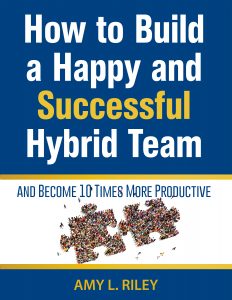
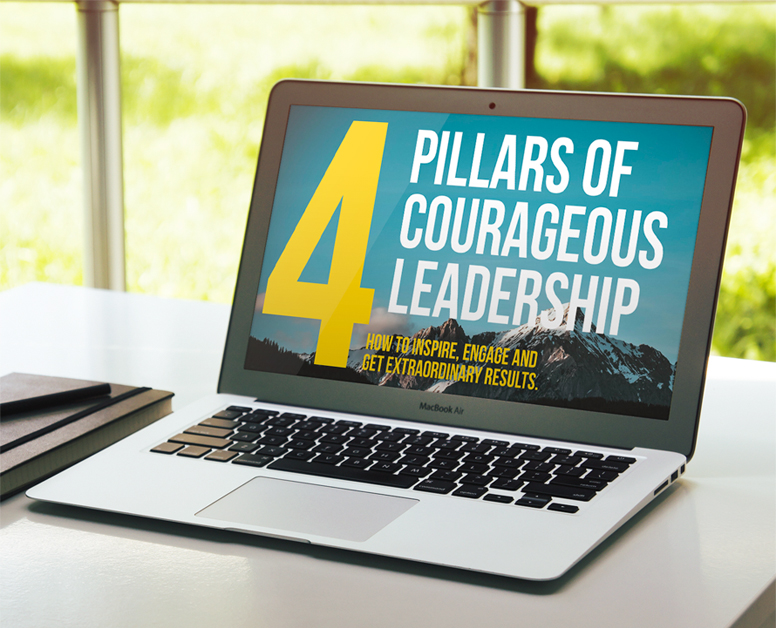 A Summary of The Courage of a Leader® 4 Pillars
A Summary of The Courage of a Leader® 4 Pillars